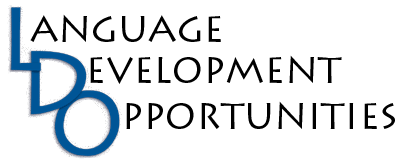
Training Catalog
Book any of these trainings for your district.
EL Program Review and Data Dive
Build a stronger EL program in your district. Teams will assess their student data (ORS, Assessment Analytics and CEE if available) and previous professional development, and design achievable steps to improve instruction for ELs in conjunction with their School Improvement Plan (SIP), Teacher and Principal Evaluation Program (TPEP), Common Core State Standards (CCSS), and their Indistar indicators, if applicable. Includes the same district data review that OSPI teams will perform during comprehensive program review (CPR), and meetings with all stakeholders: administrators, teachers, parents, paraprofessionals, students. Districts receive a comprehensive written report of the findings.
Hours: 36
Audience: District/school administrators, instructional leadership teams, classroom teachers in grades K-12.
Academic Conversation: Building Authentic Student Engagement
This workshop focuses on academic conversation skills that will enable students to build deeper comprehension of content topics. It will show the connection between the new ELP Standards, the Washington State Speaking and Listening standards, and will assist teachers in meeting the requirements of the Distinguished level for student engagement in all three TPEP models. We will learn, practice and build lessons based on the five conversation skills explained in Academic Conversations: Classroom Talk that Fosters Critical Thinking and Content Understandings by Zwiers and Crawford (2011). The skills will apply to any content area, however this course will focus on language arts.
Includes the Talk**Write**Learn lesson design model, which includes specific conversation skills connected to CCSS and ELP standards, and written work based on student ideas developed during academic conversations.
Hours: 6-18, depending on how many grade levels and lesson modeling with students
Audience: Classroom teachers, grades K-12.
Comprehensive Sheltered Instruction
Certain specific instructional components result in academic achievement for ELLs. These include using content AND language objectives, accessing background knowledge, direct and embedded vocabulary instruction, hands-on learning strategies, academic conversation skills, and assessment for language as well as content.
This training series will give teachers and administrators an overview, in knowledge and practice, of each of these components to enable them to improve achievement for their ELL students. Teachers will plan and implement sheltered instruction lesson for their own setting.
Hours: 18-24, depending on lesson modeling
Audience: District/school instructional leadership teams, classroom teachers in grades K-12.
Quick & Effective Strategies for Paraprofessionals
Teachers often have minimal time to plan instruction with parapros or EAs. They have to rely on their wits and their own skill set. In this training they will learn quick access strategies to assist them in teaching language development and comprehension skills to ELs when they don’t have time to consult with the classroom teacher. They will take away graphic organizers, vocabulary and reading strategies and games that will complement most assignments in most grade levels. All ideas in this workshop will be easy to “pull out of the bag” without much previous preparation.
Hours: 3-12. Length and depth is flexible. Inquire for details.
Audience: Paraprofessionals. Lead teachers are also welcome.
Content and Language Objectives that Work
ELLs need to be supported in with specific targets for the language required to comprehend content. This workshop gives teachers practice in identifying the academic language required for a lesson, and in writing clear, measurable objectives that include content and language targets. This workshop enable teachers to reach the Distinguished level in the Preparation component of all three TPEP models.
Hours: 3-6
Audience: District/school instructional leadership teams, classroom teachers in grades K-12.
Layers of Meaning: Vocabulary Development
Introduces research and classroom strategies for vocabulary development based on the work of Marzano, Beck, and Kinsella; develops this key area of literacy for all learners that is particularly critical for ELLs.
Hours: 3
Audience: District/school instructional leadership teams, classroom teachers in grades K-12.
Cultural Competence and Language
An exploration of how language is tied to culture and how it affects learning. Participants explore their own culture as a starting point to understand others, and look at specific components of language that are culture driven.
Hours: 3
Audience: District/school instructional leadership teams, classroom teachers in grades K-12.
Instructional Coaching
Instructor meets with school teams to determine needs based on data (see EL Program Review and Data Dive). Teams determine the problem of practice and SMART goals. Instructor coaches program design, lesson planning, observation and feedback, and/or co-teaching. Based on Learning Forward’s Standards for Professional Learning and Learning Focused Supervision by Lipton and Wellman.
Hours: TBD
Audience: Classroom teachers and principals in grades K-12.
ELP Standards in District
Washington adopted new English Language Proficiency Standards (ELPS) in December 2013. This training will give teachers and administrators an understanding of how the ELPS align with Common Core State Standards (CCSS) and how use them to design effective lessons for ELL students.
Hours: 3-6
Audience: K-12 staff or specialized for grade bands K-1, 2-3, 4-5, 6-8 and 9-12.
